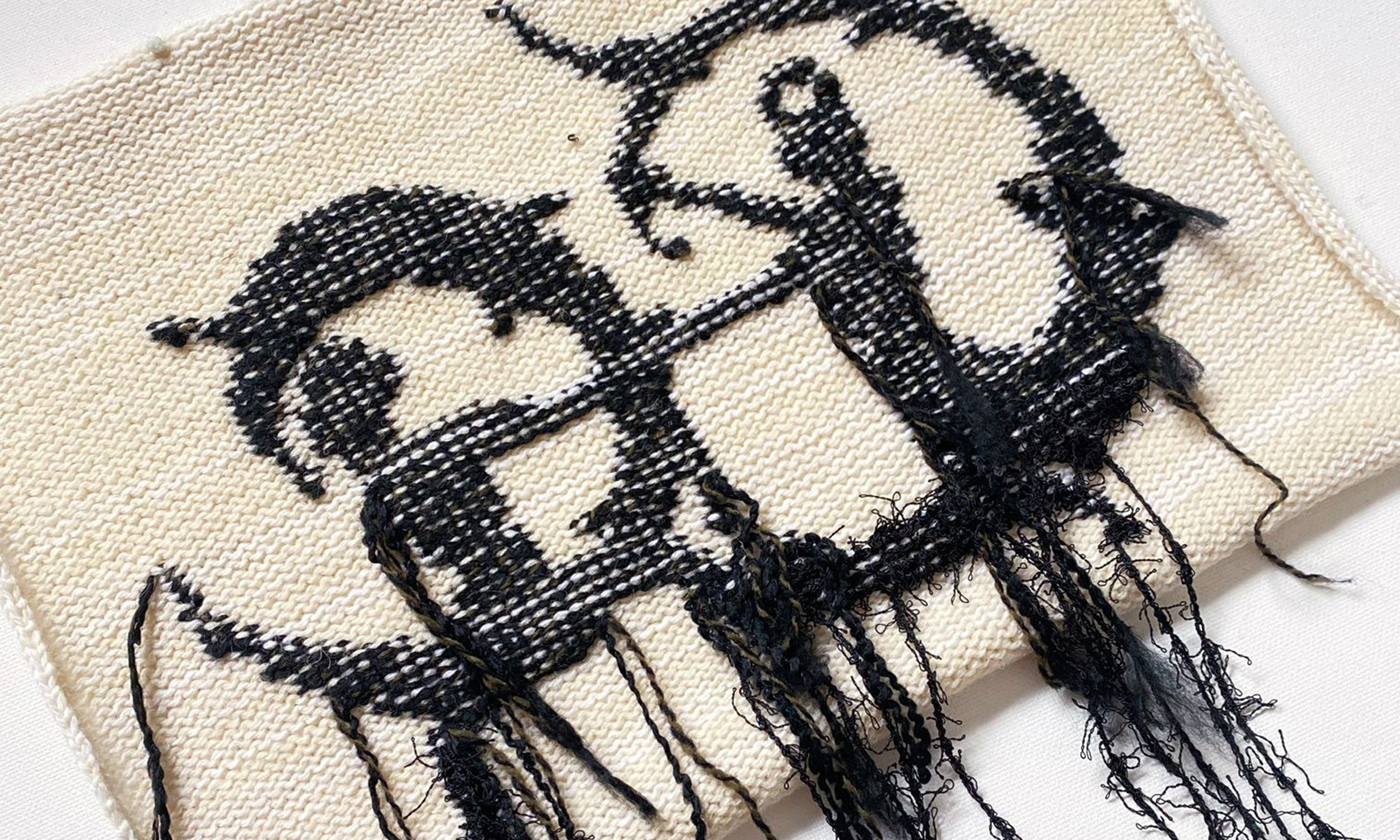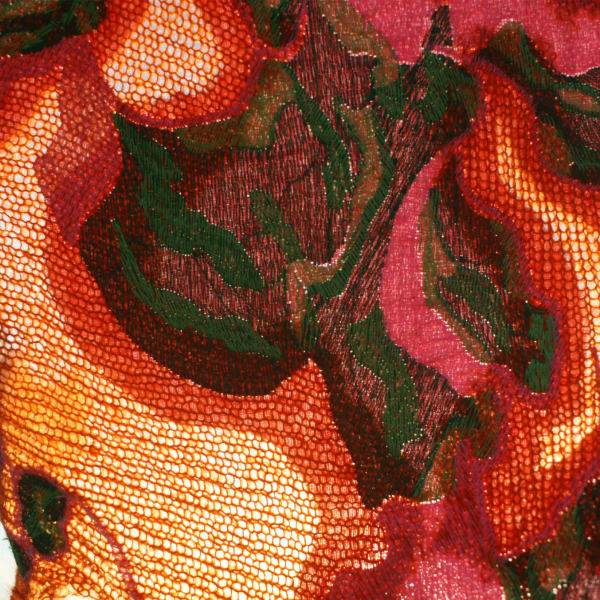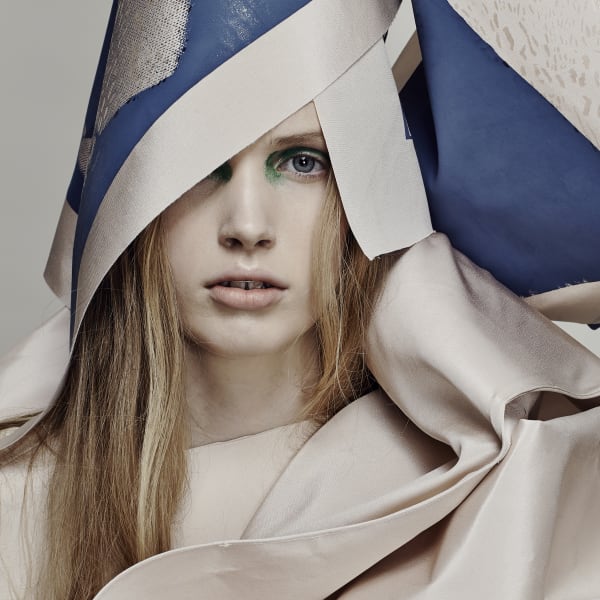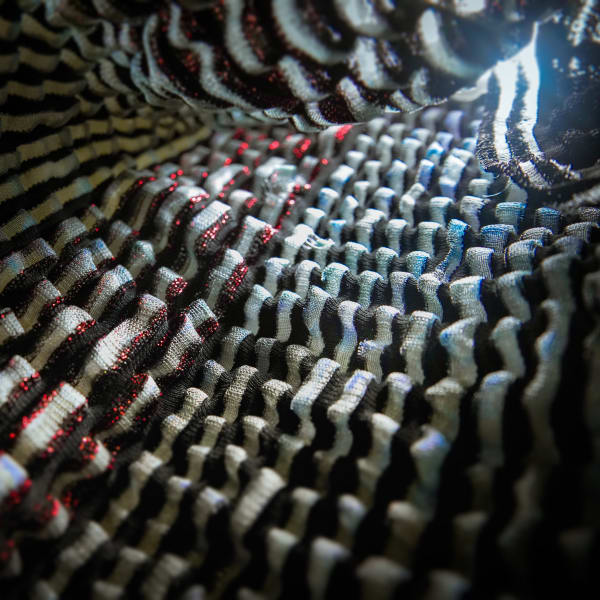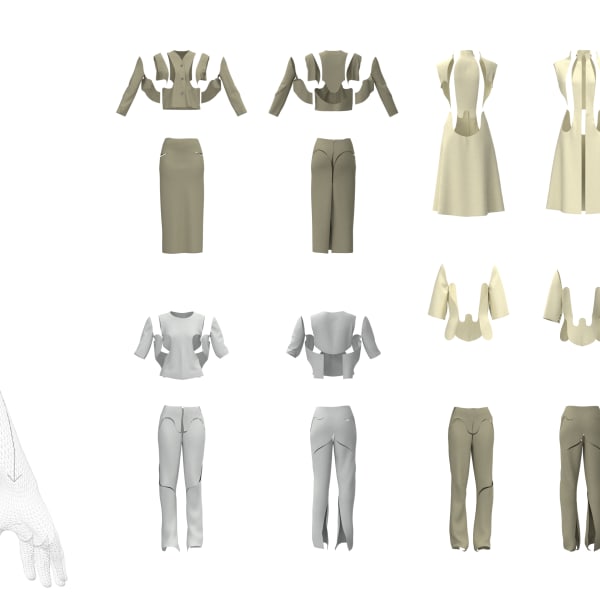Polly Kenny is the Programme Director for Materials and has an MA in Fashion Studies, the Embroiderers Guild Beryl Dean Award for excellence in the teaching of embroidery and is a member of the Worshipful Company of Broderers. Her industry experience is extensive and has been through collaborative partnerships with, for example, Broderie Anglaise and Peter Wright Europe Ltd at the industry’s textile fairs such as Heimtextil. She is a member of the Higher Education Academy and previously Vice Chair of the London Branch of the Society of Dyers and Colourists.
Her pedagogic research embraces the development of digital resources to support the teaching of embroidery whilst her textile practice explores traditional embroidery and the mark of the hand, through recent technologies articulating ideas emerging in response to memory and the exploration of the archive.
Exhibited work includes in ‘Making research: Researching Making’ conference, University Aarhus, ‘Mind and Body’ and ‘Uncovering the Surface’ conferences, USA, ‘Suave 2’, Spain, ‘Modular’ 5th International Design Biennial, Russia and ‘Square-Carré-Cuadrado’, 3rd International Biennial’, Women in Textiles Art, Venezuela.
Research papers include ‘Crafting the Digital’ presented at the 6th International Conference of Textiles, Tirana, ‘Margaret Nicholson Embroideress and Teacher: an exploration of her legacy’, at the ‘Transition: Rethinking Textiles and Surfaces’ conference, University of Huddersfield and ‘CADCAM: the continuation of craft embroidery traditions’ presentation at the Royal Museum Toronto at the Cloth Cultures conference. The presentation focused on the embedding of the study and use of the archive to enrich learning and how technological innovation can be explored to support conventional methods of textile design.
Andrew Kenny is the former BA (Hons) Fashion Textiles: Embroidery Pathway Leader, Owner, Design Director and CEO of The London Embroidery Studio Ltd. and has been the Development Lead on this MA.
Andrew is a graduate of Goldsmiths College and the Royal College of Art. He has 17yrs teaching experience in Higher Education, predominately at LCF but also as a visiting lecturer at Goldsmiths, London Met, Royal College of Art and Manchester School of Art. He played a vital role in writing the original BA (Hons) Fashion Textiles degree course and has contributed to the curriculum development of the embroidery pathway and embroidery workshop.
Andrew set up the London Embroidery Studio in 2007 to create bespoke embroidery designs for fashion, film, TV, theatre, interiors, artist and events clients worldwide. The studio has invested heavily in cutting-edge, custom-made, digital machine embroidery equipment and software and is known internationally for their innovative, creative and experimental approach to digital machine embroidery. The studio currently boasts the best range of equipment in the UK and has a staff of highly trained designers and technicians (the majority of whom are LCF graduates) to create and produce their work.
They create work for clients such as Christian Dior, Celine, Louis Vuitton and Vivienne Westwood as well as for Disney, Warner Brothers, the BBC, Netflix and Apple TV and CMF work for leading sportswear, automotive and aeronautical companies.
The studio regularly exhibits their work at trade fairs and exhibitions in London and Paris and has won several awards for their work including a D&AD Yellow pencil Award for their work on a fully embroidered animation for the BBC and more recently, a Changemakers award from Swarovski and the British Fashion Council for their work championing craftsmanship and promotion of their craft through embroidery classes and exhibition.
Alice Richardson is Pathway leader for BA (Hons) Fashion Textiles: Embroidery and MA graduate from the Royal College of Art. Alice is a Freelance Embroidery Designer specialising in experimental and innovative couture hand embroidery with a mixed media and sculptural approach. This inventive approach to her work was recognised by her winning a Hand & Lock Prize 2007 and the WGSN Global Fashion Awards Swarovski Student Prize in New York in 2011. Alice has worked on couture and catwalk creations for leading labels such as Dior, Celine, Diane Von Furstenburg and Victoria Beckham as well as embellished costumes for film, TV and stage. Clients include Disney, Pinewood, Netflix, HBO, Apple TV and the BBC. She has undertaken international professional collaborations in Mexico on behalf of the British Council, at factories in India to stimulate innovation in their design of embroideries for large scale production and to expand their overseas markets. Alice has also worked in Austria at Swarovski HQ, as a guest innovation designer developing new trends for their embellishment products and techniques. Alice has worked closely with Andrew Kenny at LCF and at The London Embroidery Studio where she heads up the hand embroidery design and production side of the studio creating innovative hand embroidery designs for all of their clients. Her work has been exhibited at tradeshows as part of Maison D’Exception at Premiere Vision, Paris and Textile Forum, London in collaboration with The London Embroidery Studio. Alice has extensive teaching experience predominantly at LCF but also as a Visiting lecturer at Royal College of Art, Central Saint Martins and Leeds Metropolitan University.
Carolyn Clewer is the Pathway Leader for BA (Hons) Fashion Textiles: Knit and an MA graduate from the RCA. Carolyn works in knit partnership 'Paris Essex' rooted in fashion, archive including knitwear and accessory collections and collaborations. Now creating one-off pieces that blur craft, design, high art and low culture, work has been exhibited, sold and published internationally. Recent collaborations include digitally designed, customised knitwear projects with Unmade Studio and capsule menswear knit collections for Wolsey. Carolyn is an advisor to digital knit machine developers Kniterate. She has extensive teaching experience and has won student-led awards at UAL.
Sarah Cheyne is a design lecturer for the BA (Hons) Fashion Textiles course and an MA graduate from the RCA. With over 20 years' experience in the creative industries including running her Dalston-based design studio. Sarah has created textile designs for clients in Europe, USA and Japan, selling to an international clientele including Christian Dior, Guy Laroche, Aquascutum, Calvin Klein & Macy’s. As an alum of Texprint (TexSelect) Sarah has worked with the organisation for over 20 years, helping launch the careers of talented textile graduates. As projects coordinator she has arranged paid internships with companies such as Paul Smith and Liberty, accompanied prize winners to Shanghai to exhibit their work at Intertextiles, and is frequently invited as a member of the judging panel for the prestigious TexSelect awards.
Gabrielle Miller is a designer, researcher and academic lecturer in fashion and sustainability, mixed-media textile design, and fashion-tech futures. She lectures on the BA (Hons) Fashion Textiles course and is the LCF Knowledge Exchange Project Leader on the Erasmus+ FTAlliance project, working with institutions and industry across Europe to research and transform pedagogy. Gabrielle’s background is in fashion and textile design, where she brings knowledge and expertise drawn from her time working at leading fashion houses including Alexander McQueen, Givenchy and Burberry. Themes of equality and ecology are core to her work, informing the impetus for her practice and work in education, which are strongly connected with environmental, societal and cultural change.
Nathan Philpot, Technical Specialist at London College of Fashion and MA graduate from the RCA. In 2010 Nathan and his wife Gemma Ooi established their own brand called Custhom. This is a research-based design practice working with handmade processes. By experimenting with tactility and graphic-led design the studio has created a collection of wallpapers, ceramics, textiles and designed products that are all sold internationally. Custhom has a detailed approach to materials and processes and works with clients on concepts for branding, retail spaces, restaurants, and domestic projects, often in collaboration with respected architects and interior designers. Their clients include Design Museum, Somerset House, Liberty London, Barber and Osgerby, LG and Clarks.
Veronika Kapalski is Professor in Material Technologies and lead for the Active Material System Research (AMSR) group that studies the intersection of textile design + STEM disciplines and applies these multidisciplinary lenses, to introduce design with structure, information, space, and time to textile-based materials systems. The AMSR group is composed of research, academic and technical members of staff from across UAL in addition to PhD students and Post-Doctoral Research assistants.
